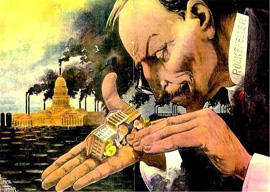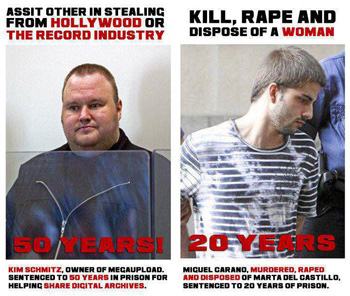
January 27, 2012

Critics note that Kim has a history of committing hacking crimes going back to the late 1990s when he was arrested for stealing credit-card numbers. They claim the only recourse for a repeat offender like this is 50 years in prison. Bill Maher calls Kim’s crimes “Caucasian looting.”

But this assumes that people who downloaded Maher’s film for free are the same ones who would have happily paid $11.98 for it. We believe the people who downloaded Maher’s film aren’t the same ones who would have bought it online. They are new customers, people who wouldn’t have otherwise seen the film. In that sense, Kim Dotcom has increased the size of the pie. Maher should be thanking Megaupload. And he should realize that unestablished artists far less famous than he is need social networking to survive. As tech writer Tim O’Reilly famously put it, “Obscurity is a far greater threat to authors and creative artists than piracy.” Kim Dotcom has enabled more music and movies to get to more people. If anything, he has stimulated the industry. It’s this kind of innovation that made America a superpower. When an old model isn’t working it gets pushed aside for something more innovative. Filesharing is a perfectly legitimate business that even companies such as Microsoft use.
This is all covered in Matt Mason’s brilliant book The Pirate’s Dilemma. Mason points out the term “Yankee” comes from Janke, which is Dutch slang for “pirate.” A huge part of America’s wealth came from disregarding European intellectual copyrights on tools and machinery. Europe had the same contempt for our piracy that we now have for China’s.
Mason also talks about Hollywood’s origins, where rebellious entrepreneurs such as William Fox fled to the Wild West after being fed up with all the taxes and regulations required to make movies in New York. Ironically, the company that is his legacy—20th Century Fox—is now employing movie stars to encourage people to obey all taxes and regulations.
Online “piracy” isn’t looting. It’s capitalism. It forces dinosaurs to evolve or become extinct. The music and movie industries are in denial, mistaking progress for criminal activity. In fact, they’ve already benefited from piracy’s kick in the ass. Music piracy sites such as Napster forced an antiquated model to reinvent itself, and today we have solutions such as iTunes at a dollar per song and Spotify’s monthly subscription rate. These new systems didn’t kill the music industry; they saved it.
The same thing has happened with films. Though Americans are going to theaters 10% less than they did in 1999, profits are up. Why? Because Hollywood came up with new ideas such as creating 3-D versions with a higher ticket price. We’re told Kim Dotcom cost the movie business $600 million, but who came up with this number? It’s not easy to prove Megaupload practiced due diligence in preventing people from sharing copyrighted material, but it’s even harder to prove it caused the industry monetary damage.
Kim Dotcom is bombastic, arrogant, fat, hedonistic, and reckless. He laughs in authority’s face and taunts both corporations and bureaucrats. He isn’t a villain. He’s a hero. What’s more, he is one of us. If Kim Dotcom loses this fight, it will mean Big Government and Big Business run this country and a big part of what made us great is now dead.